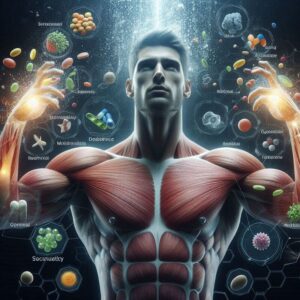Unlock Your Muscle Recovery Potential: Key Nutritional Strategies for Success
To achieve the highest level of muscle recovery, it is imperative to focus on specific macronutrient ratios in your diet. The three essential macronutrients—protein, carbohydrates, and fats—are not merely sources of energy; they are fundamental elements that support the structural integrity of your body and play critical roles in various physiological processes. Each of these macronutrients contributes uniquely to the repair and regeneration of muscle tissue. Therefore, anyone dedicated to improving athletic performance and recovery should develop a comprehensive understanding of how these nutrients interact to optimize muscle healing.
Among these macronutrients, protein stands out as particularly crucial for muscle recovery, as it comprises essential amino acids necessary for effective muscle repair and growth. Consuming a sufficient amount of protein after exercise significantly boosts muscle protein synthesis, the process responsible for forming new muscle proteins, while also minimizing the breakdown of existing proteins. This delicate equilibrium is vital for efficient muscle recovery, facilitating quicker recovery times and enhancing adaptation to training stresses. Additionally, carbohydrates play a critical role in replenishing glycogen stores that become depleted during rigorous workouts, thereby providing the vital energy required for subsequent training sessions. Lastly, fats are essential for energy production and hormone regulation, both of which are integral to the recovery process for your muscles.
Finding the optimal macronutrient ratio for muscle recovery requires a tailored approach that considers individual factors such as body composition, exercise intensity, and specific fitness objectives. However, a widely accepted guideline is to consume a combination of protein and carbohydrates within 30 minutes to 2 hours after exercise. This timeframe is crucial, as your body is particularly receptive to nutrient absorption during this recovery window, making it an ideal opportunity to nourish your muscles effectively.

Discover the Best Protein Sources to Optimize Muscle Recovery
Recognizing that protein is not just another dietary component but a vital ingredient in muscle recovery is essential for anyone involved in physical training. It provides the essential amino acids necessary for muscle repair and growth, making the inclusion of protein-rich foods in your diet critical for enhancing muscle restoration. High-quality animal protein sources, such as eggs, dairy products, lean meats, fish, and poultry, contain complete amino acid profiles that are particularly effective for muscle regeneration and recovery.
If you prefer plant-based options or wish to diversify your protein intake, there are numerous excellent alternatives available. Foods such as lentils, chickpeas, and black beans are not only nutrient-dense but also rich in protein, contributing positively to muscle recovery. Moreover, versatile options like tofu, tempeh, edamame, and other soy-based products serve as fantastic complete protein sources that can be easily incorporated into a well-rounded diet to support muscle healing.
Additionally, protein supplements like whey, casein, or plant-based powders can be incredibly beneficial for increasing your protein intake specifically for muscle recovery. These supplements offer a convenient method to ensure you meet your post-workout protein requirements, allowing for seamless integration into your favorite smoothies, shakes, or meals, thus maximizing your recovery potential.
Replenishing Glycogen Stores with Carbohydrates for Superior Muscle Recovery
Carbohydrates are essential for muscle recovery as they serve to restore glycogen stores depleted during vigorous physical activity. Consuming carbohydrates within the first 30 to 60 minutes following exercise can significantly support energy restoration and hasten muscle regeneration. During high-intensity workouts, your muscles primarily utilize glycogen as their main energy source, and the body is most effective at storing glucose immediately after exercise. Therefore, the timing of your carbohydrate intake is critical and can greatly impact muscle glycogen synthesis and overall recovery results.
Incorporating a wide variety of nutrient-rich foods, such as legumes, fruits, and vegetables—which are high in natural sugars and starches—can greatly enhance your muscle recovery while offering numerous health benefits. These foods are rich in fiber and packed with vital nutrients, providing a steady energy release along with essential vitamins and minerals needed for overall health and effective recovery. By prioritizing these complex carbohydrates in your meals, you can make informed dietary choices that significantly contribute to your body’s nutritional requirements.
Proper nutrition post-exercise is a key component of muscle recovery. Combining carbohydrates with protein can dramatically enhance muscle glycogen resynthesis while promoting effective muscular repair. This potent nutrient combination also stimulates insulin secretion, which aids in the transport of glucose and amino acids into muscle cells, further boosting recovery and repair mechanisms.

Incorporating Healthy Fats for Comprehensive Muscle Recovery and Health
While protein and carbohydrates are often at the forefront of discussions surrounding muscle repair, dietary fats are equally important for a holistic approach to recovery and overall health. Healthy fats are vital for hormone production, particularly testosterone, which plays a significant role in both muscle growth and repair processes. Foods rich in omega-3 fatty acids, such as walnuts, flaxseeds, and fatty fish, offer anti-inflammatory benefits that can help alleviate exercise-induced inflammation and expedite muscle recovery. Furthermore, these fatty acids are essential for constructing cell membranes crucial for muscle repair.
Integrating a diverse range of healthy fat sources, including nuts, seeds, avocados, olive oil, and oily fish, can provide substantial benefits for both your overall health and muscle regeneration. These fats not only enhance the flavor of your meals but can also be easily included in your post-exercise snacks, providing necessary energy while supporting various physiological processes associated with recovery. Explore different options and consciously include healthy fats in your diet; your muscles will certainly appreciate the effort!
While fats are essential for a balanced diet, moderation is key. It’s crucial to avoid excessive consumption of unhealthy fats, such as trans and saturated fats, as these can promote inflammation and hinder overall healing and performance. Therefore, achieving a well-balanced intake of fats is vital for optimal muscle recovery.
The Vital Role of Hydration in Optimizing Muscle Recovery
One of the most frequently overlooked aspects of muscle recovery is the critical importance of hydration. During physical activity, our bodies lose fluids through sweating, and neglecting to replenish these lost fluids can lead to dehydration. This condition can severely impair performance and prolong muscle recovery times. Dehydration negatively affects nutrient transport to muscles, raises the risk of cramping, and may even result in muscle damage.
Maintaining sufficient hydration not only supports muscle recovery but also enhances overall health and well-being. Proper fluid intake facilitates nutrient transportation, regulates body temperature, and helps in waste elimination. Ensuring that you stay well-hydrated before, during, and after exercise is essential for facilitating effective muscle recovery. While water is the most effective hydration solution, consider incorporating electrolyte-rich beverages like sports drinks or coconut water to replenish lost electrolytes during intense physical activity.
Being attuned to your body’s hydration signals is crucial for maximizing recovery. Monitoring indicators such as urine color, changes in body weight, and feelings of thirst can provide valuable insights into your hydration status. This self-awareness can help you maintain optimal fluid intake, thereby promoting maximum muscle repair. Additionally, including more water-rich foods, such as fruits and vegetables, can further enhance your hydration and recovery efforts.

Key Micronutrients Essential for Accelerating Muscle Recovery
Understanding the significance of micronutrients, which encompass vital vitamins and minerals, is crucial for effective muscle recovery and overall health. These micronutrients are not optional supplements; they are essential components that influence various physiological processes, including exercise performance and recovery. For instance, the antioxidant properties of vitamin C can help mitigate the inflammatory and oxidative stress that occurs during exercise, while vitamin D is vital for maintaining bone health and facilitating muscle function.
Key minerals such as iron, magnesium, and zinc are instrumental in energy production, oxygen transport, and muscle function during physical activity. To support optimal muscle repair, it is essential to consume a balanced diet rich in fruits, vegetables, whole grains, lean proteins, and healthy fats.
While athletes may consider supplementing with specific micronutrients to address deficiencies or meet the heightened demands of rigorous training, it is crucial to seek professional guidance. Consulting with a healthcare professional or a certified dietitian before starting any supplementation regimen can ensure safety and effectiveness, allowing you to feel more informed and confident about your dietary decisions.
Ultimately, food plays a pivotal role in muscle recovery following intense physical activity. Striking the right balance among macronutrients—including protein, carbohydrates, and fats—along with proper hydration and micronutrient intake is vital for effective muscle regeneration and enhancing athletic performance. By being mindful of your dietary choices and providing your body with the necessary nutrients, you can facilitate quicker healing, reduce the likelihood of injury, and elevate your overall fitness level.
Common FAQs: Muscle Recovery and Nutritional Insights
What Does the Muscle Recovery Process Entail?
Muscle recovery involves a complex and multifaceted process through which muscles repair and rebuild after experiencing physical stress, such as exercise or resistance training. This essential process is key to promoting muscle growth and improving overall physical performance, enabling your body to adapt effectively to the demands of training.
How Does Diet Affect Muscle Recovery?
Your diet plays a crucial role in muscle recovery, as it provides the necessary nutrients that facilitate muscle repair and growth. Achieving the right balance of macronutrients (protein, carbohydrates, and fats) along with micronutrients (vitamins and minerals) is essential for optimizing muscle recovery and overall athletic performance.
What Dietary Approach is Most Effective for Muscle Recovery?
The most effective diet for muscle recovery generally includes a balanced combination of high-quality protein, carbohydrates, and healthy fats. Foods rich in protein, such as lean meats, fish, eggs, and dairy products, are particularly beneficial for supporting muscle repair and growth. Carbohydrates are essential for providing energy for workouts and replenishing depleted glycogen stores, while healthy fats contribute to overall health and hormone production.
How Much Protein Should I Consume to Boost Muscle Recovery?
The general recommendation for protein intake aimed at muscle recovery ranges from 1.2 to 2.2 grams of protein per kilogram of body weight per day. This range may vary based on individual factors, including activity level, muscle mass, and specific training goals.
Are There Specific Foods That Enhance Muscle Recovery?
Foods that are abundant in protein, such as chicken, turkey, salmon, eggs, Greek yogurt, and tofu, are particularly effective in supporting muscle recovery. Additionally, including complex carbohydrates from sources like whole grains, fruits, and vegetables, along with healthy fats from avocados, nuts, and olive oil, can further aid in muscle recovery and bolster overall athletic performance.
Should I Consider Supplementation to Support Muscle Recovery?
While a nutritious, well-balanced diet can typically provide the essential nutrients needed for muscle recovery, some individuals may benefit from supplements like protein powders, branched-chain amino acids (BCAAs), or creatine to support their recovery and performance goals. It is important to consult with a healthcare professional before introducing any supplements into your diet to ensure safety and effectiveness.
This valuable information is brought to you by:
Trusted References for Muscle Recovery and Nutritional Insights
Nourish Your Hair: Protein Intake and Hair Health. https://www.theproteinfactory.pk/blog/protein-and-hair-health/
The Maximum Calorie Intake to Lose Weight | Woman – The Nest. https://woman.thenest.com/maximum-calorie-intake-lose-weight-17436.html
The Article: Optimal Diet for Muscle Recovery appeared first on Acupuncture Cottam.
The Article Muscle Recovery: The Optimal Diet You Need appeared first on https://mcrtherapies.com
The Article Optimal Diet for Muscle Recovery You Need Was Found On https://limitsofstrategy.com


I really appreciate how you’ve broken down the importance of macronutrients for muscle recovery. It’s fascinating to think about the balance we need to strike to optimize our recovery just as much as our training. I’ve been trying to focus on my post-workout nutrition lately, especially increasing my protein intake. I’ve noticed a big difference since I started blending in some lean meats and plant-based proteins.